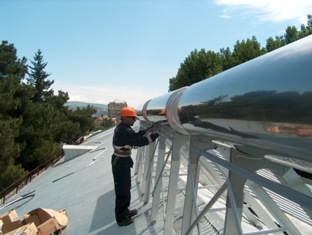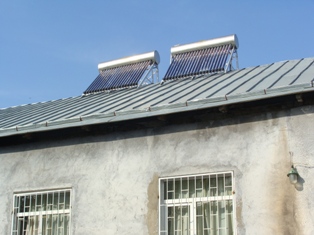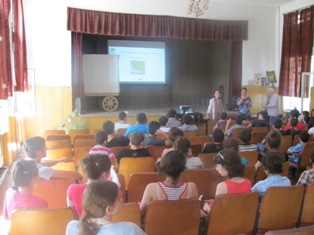|
 |
 |
|
|
|
|
Introduction of Solar
Thermal System in Tbilisi Public School #203 for Deaf and
Diminished Hearing Children
Works performed in the period December 1, 2011- December 1,
2012 included:
-
After
assigning the sub-project Task Manager and development
of detailed work plan for the implementation of the
sub-project, on January 25,2012 the project presentation
to the beneficiary organization took place. EEC Georgia
team together with the representative of sub-contractor
for the installation of solar thermal systems “Caucasus
Solar” LTd, arranged site visit to meet the
administration of School #203. Ms. Nino Kvaratskhelia.
During the visit EEC Director, Mr. George Abulashvili
introduced the project implementing team, presented
project goals and objectives, informed the
administration about the planned activities and expected
results. The project got endorsement of the school
administration and technical staff to support the
project team during the design stage and supervise site
works from the beneficiary organization side was
appointed;
-
Obtaining
necessary information and documentation from the school
administration to discuss the technical issues connected
with the installation of solar water heaters, specify
the scope of works to be performed by the
sub-contractor;
-
Drafting
and discussion of the terms of the agreement with
sub-contractor “Caucasus Solar” Ltd for the construction
of 2000 l total capacity solar thermal system consisting
of 10 units of 200 l capacity pressurized integrated
system made of 70 mm diameter super vacuum tubes, 200 l
tank and electric heating element, electronic controller
to meter thermal energy output. A special attention in
the agreement was paid to the HSE requirements with
emphasis to working on heights and observation of BP
Golden Rules of Safety. The sub-contract agreement with
“Caucasus Solar” Ltd for the construction of 2000 l
total capacity solar thermal system was signed on
February 23, 2012.
-
The
training for both Task Managers for solar projects and
sub-contractor’s employees on Personal Protective
Equipment (PPE) was conducted on March 9,2012 and
covered the following issues: In what types of
situations should PPE be used, eye and face protection;
head protection; foot protection; hand protection; body
protection. Minimum PPE equipment and their usage was
discussed. The discussion around covered topics was
accompanied by video material.
-
After
visiting the site HSE Specialist developed necessary HSE
requirements to be observed during the installation of
solar water heaters including: appointment by the
sub-contractor of dedicated person for the
implementation of HSE requirements on site,
identification of potentials risks and necessary signs
on site, issuance of daily work permits by assigned HSE
specialist, PPE to be used on site and rules of their
usage, HSE requirements during working on heights,
mandatory safety rules while working with ladders,
safety requirements during lifting works, HSE
requirements during electrical works on connecting
electric heaters to the power source, first aid issues
and sanitary requirements to be observed on site.

-
Before
starting the site works the school administration was
assisted in obtaining approval from the Tbilisi
Municipality Architectural Department on the
installation of solar system.
-
The
physical installation of solar system on school building
roof lasted 6 days from May, 15, 2012 through May 20,
2012. The works on height were conducted in compliance
of all the recommendations of EEC Georgia HSE Specialist
who monitored the works on daily basis.
After the installation of solar system on the roof the
thermal meter and controller were installed and the
works on connection of the system with the water supply
system performed, including: arrangement of hot water
supply piping to existing 8 washstands and their
connection to the solar system; repair of 2
non-operating showers and 2 washstands and their
connection to the solar system in the school corridor
and connected to the solar system and tested. It should
be pointed out that as reported at the initial stages of
the project implementation the connection of solar
thermal system with the existing heating system as it
was initially proposed didn’t took place due to some
serious technical problems with the operation of
existing central heating system and estimated savings in
natural gas consumption will not be achievable.
-
O & M
guidelines for installed solar thermal system for local
staff have been prepared and delivered to the local
technical staff upon testing of the equipment.

-
The
checklist for registration and calculation of ongoing
outflow of electricity in order to compare electricity
consumption after installation of solar thermal systems
was prepared. The metering data are collected on a
monthly basis beginning from September after the school
year start. School administrative staff is actively
involved in motoring process.
-
In
September, 2012 the school administration requested
reallocation of two solar collectors (with total
capacity of 400 liters) on the roof of the school’s
canteen in order to have the hot water in the kitchen.
These works lasted 3 days from October 19 through
October 21, 2012.
-
As
mentioned above monitoring data are gathered on a
monthly basis. The monitoring data for September,2012
through August, 2013 including electricity and water
consumption and comparative analysis regarding the same
period of the previous year is shown in the table below:
|
Time Period |
CONSUMPTION BY YEARS |
|
2011 - 2012 |
2012 - 2013 |
|
Electricity kWh |
Water M3 |
Electricity kWh |
Water M3 |
|
September |
4,332 |
737 |
1,476 |
494 |
|
October |
5,743 |
466 |
1,724 |
377 |
|
November |
2,635 |
368 |
3,532 |
535 |
|
December |
9,994 |
889 |
6,584 |
451 |
|
January |
8,702 |
1096 |
2,536 |
220 |
|
February |
8,416 |
766 |
5,176 |
233 |
|
March |
6,386 |
845 |
4,932 |
426 |
|
April |
12,273 |
529 |
3,888 |
311 |
|
May |
4,644 |
327 |
2,856 |
238 |
|
June |
5,000 |
427 |
2,446 |
429 |
|
July |
2,568 |
412 |
760 |
131 |
|
August |
180 |
156 |
732 |
143 |
|
Total for period |
40,002 |
7,518 |
22,520 |
3,988 |
As can be seen from the table for the
period under consideration both electricity and water
consumption has been reduced. In the below table the
archived savings in energy consumption, bill saved and
emission reduction for the period September 2012 - August 2013
are given.
|
|
Savings for period |
Bill saved GEL |
Reduced CO2 |
|
Electricity, kWh |
17,482 |
2,797 |
6,984.1 |
|
Water, m3 |
3,030 |
13,332 |
|
|
TOTAL |
|
16,129 |
6,984.1 |
As can be seen from the table Total
electricity savings for the period - 17482 kWh which is
about 44%; Energy and water bill savings for the period -
16129 GEL;
Emissions reduced - 6984 kg CO2.
-
On June 14, 2012 the training in
Renewable Energy Applications with emphasis on solar
energy was conducted for schoolchildren and
teachers. The training was conducted with the
assistance of teacher to ensure sign language
translation for the children. During the training
video material illustrating the solar energy
applications was demonstrated. After the training
the participants received sets of brochures and
leaflets on renewable energy applications.

-
On June 20, 2012 the solar system
commissioning event took place. The event was
attended by the representatives of donor
organization BP Georgia - Mr. Zurab Topuridze, Ms.
Kristina Khabalashvili, Mr. Giorgi Gongliashvili,
Ms. Tamila Chantladze, Ms. Irine Kurdadze (deputy
Minister representative of Georgian Ministry of
Education & Science), school personnel,
representatives of Energy Efficiency Center Georgia
and media.
-
Special information stand was
prepared and installed at the entrance of the school
#203. The stand contains information about project
donors and implementing organizations as well as
description of installed solar thermal systems and
achievable savings in energy consumption and
environmental benefits.
-
The preliminary information on
the solar thermal system commissioning event at
school#203 was disseminated through the
press-release prepared by PR consultant of the
project. The commissioning event was covered by
invited media. The press release and copies of TV
spots broadcasted by various media could be seen in.
-
The information on the event was
also uploaded on EEC Georgia’s facebook.
Updated: September 24, 2013 |
|
|
|
|
|
|

